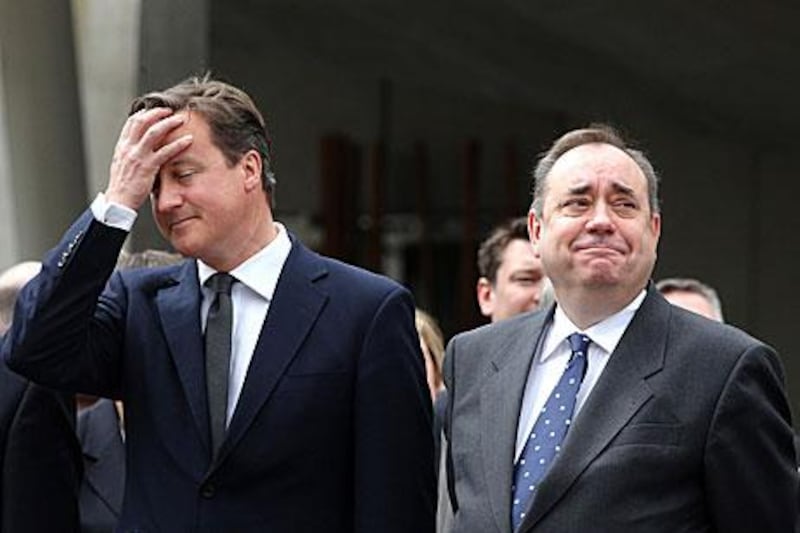LONDON // Scottish independence has elbowed its way to the top of the political agenda in Britain as the UK government tries to wrest the initiative from nationalists north of the border.
The assertion by Prime Minister David Cameron's government that only it - and not the quasi-autonomous Scottish government - has the legal power to legislate on an independence referendum appears to have put the Westminster and Edinburgh administrations on a constitutional collision course.
It has also made Mr Cameron and his colleagues vulnerable to accusations from nationalists, who now control the Edinburgh parliament, that English Conservatives are once more riding roughshod over Scottish wishes.
Though Mr Cameron is aware of the dangers, he felt obliged to act in a bid to stop the Scottish First Minister Alex Salmond, the leader of the nationalists and widely regarded as Britain's most charismatic politician, from exploiting the issue.
Mr Salmond, who will be in Abu Dhabi next week for the global energy forum, has now set the autumn of 2014 as the date for a referendum, a few months after the 700th anniversary of the Battle of Bannockburn, when the Scots defeated the English in a war of independence.
However, Michael Moore, the Scottish secretary in the coalition government in London, told the House of Commons on Tuesday that any attempt to stage a referendum on the basis of legislation passed in the Scottish assembly would be unlawful.
The UK government also wants just one question in the referendum: a straight yes or no to independence. It also wants the minimum voting age to be 18, as in other elections.
Mr Salmond favours a second question, offering maximum devolution while remaining part of the UK. He has also proposed that 16- and 17-year-old Scots be allowed to vote.
Predictably, he has accused the London administration of trying to interfere in Scottish affairs and has told Mr Cameron to "butt out".
"I thought his intervention was almost Thatcher-esque in its nature," Mr Salmond said in a BBC radio interview yesterday. "The idea that London knows best and it is operating in our best interests but wanting to set the ground rules for our referendum despite the fact it has got no mandate whatsoever for doing so."
However, Mr Moore, speaking on BBC Radio Scotland yesterday, insisted: "The problem we have as Scots is that, in the original Scotland Act (which established the Scottish parliament in 1998), the power to have referenda on issues to do with the constitution was not included."
Behind the posturing of both sides, though, there is a growing belief that quiet negotiations over the coming year will resolve the rules of combat, if not the outcome, of the battle between Braveheart and Lionheart.
dsapstad@thenational.ae
@ For more on SCOTLAND, visit thenational.ae/topics
Scottish nationalists criticise UK PM's 'Thatcher-esque' meddling
Scottish independence has elbowed its way to the top of the political agenda in Britain as the UK government tries to wrest the initiative from nationalists north of the border.

Editor's picks
More from the national




